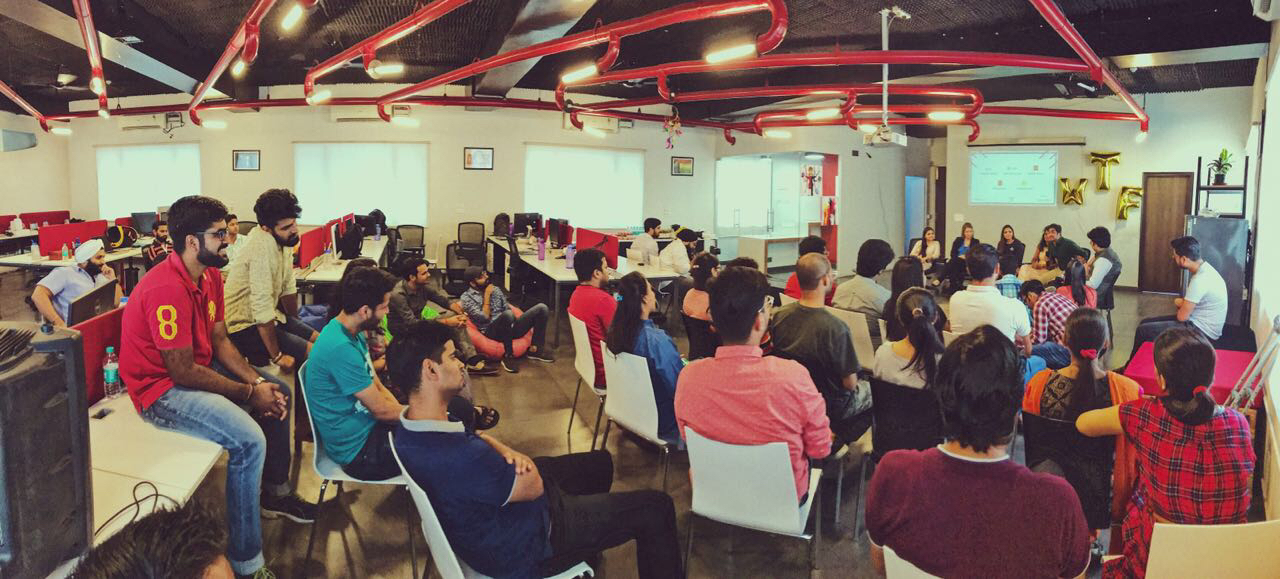On the evening of June 22nd, We the Fueled, in association with Last Eleven, The Haven, and Brewhouse, presented a panel discussion focused on diversity in tech, specifically the challenges women face in the tech space. Panelists included Angela Cecilia, Social Media Head at The Communication Council, Bethany Clark, Manager of Corporate Communication Solutions at Rethink Solutions, Prerna Kalra, Founder of Daalchini, Seena Ahuja, Lead QA Manager at Fueled, and Manish Ahuja, Lead iOS Engineer at Fueled. The conversation was moderated by Fueled team members Navneet Kaur and Akash Mishra.

We the Fueled is Fueled’s committee devoted to diversity in tech and inclusion in the workplace, with a mission to connect Fueled team members with new ways to lead, learn and serve. This panel was the second in the committee’s WtF Presents series— an initiative to empower women with amazing careers across a variety of industries to “fuel the conversation” by sharing their personal stories far and wide.

Inclusivity and Diversity in Tech
Topics of discussion included gender-bias, working mothers, and creating a company culture for diverse teams, but the panel started with each panelist explaining what “inclusion and diversity in tech” means to them.
Angela Cecilia feels diversity and inclusion means providing equal opportunities to everyone regardless of gender, socioeconomic status, race or ethnicity. In her explanation, she cited her personal experiences in organizations where men outnumber women and are given roles that involve ideation, production, and client relationships, while their female counterparts are given roles with responsibilities like organization and administration.

Manish Ahuja added that it’s not just about having people from different backgrounds, but also making sure they are comfortable in the space— the organization should make them feel important and give them the space to grow and develop. Activities like happy hours and team dinners help boost an inclusive environment at the workplace too.
Prerna Kalra agreed that diversity and inclusion shouldn’t be considered only during the hiring process, but should be taken into account on a day-to-day basis. A conducive environment has to be created for inclusivity to be sustainable.

Mothers and the Workplace
Of the 56% of women in tech who leave their organizations at the mid-level stage in their careers, about 20% are leaving the workforce altogether. One of the most notable causes of women leaving their jobs is the societal obligation, especially in India, for women to stay at home with their children.
“Fueled is such a space where coming to work is not just work, but a lot of fun too,” Ahuja shared her maternity experience. “When I was a new mother, the knowledge that I was able to bring my child to work was very calming. It helped me focus on work more.” Company initiatives like on-site daycare are just one way to empower women in the workplace.
Prerna Kalra suggested that, by organizing “family days” at the office, companies can help in-laws and other family members to understand the impact a woman can make at the organization.

“Policies around family sensitization are needed for women to stay in the career and make it to the top,” Clark added. “Women who have support from their families are the ones who thrive and make it.” One of the tech companies she works for conducts Girls Who Code days, events where team members bring their kids to encourage them to learn to program.
Kalra also suggested that employers could benefit from providing counseling for women who may be suffering from the guilt of going back to work after giving birth. Alternately, there could be groups devoted to discussing the challenges women face when they are resuming their career after a break or planning to leave due to caring for their children.
The Gender Wage Gap
While there has been slight improvement over the past couple of years, the median salary for women is about 22% lower than for men. Women who are equally qualified and hold the same position earn about 97.8 cents for every dollar a man earns.
When asked about the gender pay gap, Clark suggested that women should push to develop more assertiveness when negotiating a salary. She feels that most of the time, women are hesitant and do not negotiate as much as men with the same skill set.
In addition to salary negotiation being a barrier, women who leave their roles temporarily to raise children do suffer from an unemployment wage penalty. A candidate who has been out of work for less than three months faces about a 4% salary decrease, and those out of work for a year or longer face a penalty almost double that. Because women are about three times more likely than men to have left the workforce to care for a child or family member, this unemployment penalty is harder on women than men. The panelists all agreed that the cause any gaps in employment should be taken into account when it comes to salary negotiations or promotions.

We have a long way to go in achieving diversity in tech inclusivity in the workplace, but we can all do our part to speak up and continue the conversation. Strong company culture is important for connecting team members from different parts of the world. We have to come up with creative ways to make people feel included when our beliefs, customs, and languages all differ.
We the Fueled exists to bridge the gap between leadership and team members by creating dialogues to promote diversity in tech and inclusion in the workplace, not just at Fueled, but in workplaces everywhere. Conversations like these are crucial to creating a space for all voices to be heard. If you’re interested in speaking up, let us know! WtF is always looking for themes and panelists for our next event.
